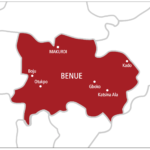Unarguably, Makurdi, the capital of Benue State, has appreciated in leaps overtime and the most striking feature is the regeneration of the metropolis.
The metropolitan area of the Food Basket State’s capital is marked by the oldest buildings, with rusted roofs and crumbling redbrick walls. But some of the old houses are being rebuilt with modern designs.
- 6 killed, 3000 displaced as bandits attack 12 villages in Niger
- Bello wants informants treated like bandits
Residential and commercial districts such as High Level, Old GRA, Wurukum and Wadata which bear the marks of an ageing town are where the regeneration is taking place, but with outright breach of the town’s physical and urban planning laws.
- Regeneration deviates from state’s physical planning
The General Manager (GM) of the Benue State Urban Development Board (UDB), Dr Saint Gbilekaa, confirmed that the regeneration of Makurdi was not in accordance with the state’s physical planning laws.
Dr Gbilekaa said although Makurdi was correctly planned, it was left in the hands of developers to do what they wanted with it as the urban planners cared little about enforcement.
He said ideally urban planning should be strictly adhered to, but that people were just building the way they liked because successive administrations of the board did nothing to educate developers on what was right.
He observed that what was rather obtainable in the new suburbs of the town indicated that planning was now running after development when the reverse should have been the case.
The GM, therefore, expressed worry that the anomaly would be almost impossible to correct based on the fact that the cost implication of planning when development had already taken place was quite huge.
He said, “To correct it, it has to go with a cost. The right people failed to educate the builders. It’s impossible to plan effectively when development is on ground.”
Gbilekaa pointed out that the implication of not adhering to the rules meant that life in the town would be chaotic.
- Planners, developers blamed
He further blamed the development on planners and developers, the later who in his estimation, zealously acquired more lands than they could handle while the former failed to effect coordination and strict adherence to planning.
The UDB boss added that his administration would do its best to correct the trend by not compromising standards, stressing, however, that since his assumption of office in 2018, the board had pulled down at least 150 illegal structures to pave way for roads and water channels.
Another fallout of the development is that the districts which were home to working class people and traders, the unemployed and students, especially of higher institutions in Makurdi, are now becoming highbrow on the property market; pushing this class of citizens to the suburbs of the town.
The accompanying challenges to this trend, among others, is that with the standard and quality of the new buildings now springing up, rent has shot up thereby making life unbearable for most tenants.
For obvious reasons ranging from the inability to afford high rents, noise and desperation to acquire personal property, the working class and businessmen are moving to suburbs such as Genabe, Welfare Quarters, Terwase Agbadu, Adeke village, among others.
- Development generates desperation – Agent
A house agent, Odey Steve, said the development also generated desperation on people to acquire land in the suburbs, some by illegal means, due to the high cost of property in the heart of the town.
He said such people go out of their way to purchase land and build without following due processes just to avoid the extreme cost of rent. Steve stressed that the bid to avoid paying high rent was responsible for the disorderliness and desperation in land acquisition and the consequent breach of physical and urban planning laws of the state.
A civil servant, Cephas Iornem, said, “I had to relocate with my family to a new site. I got pissed off with the exorbitant rent at Calabar Street because my landlord was really disturbing me. He really pushed me to go to have my own personal accommodation off George Akume Way.”
Similarly, Ann Agbo, a hair dresser, lost her shop to a magnificent building which replaced the old structure housing her salon at Wurukum.
Agbo, also an undergraduate, who relocated her salon to Terwase Agbadu, said apart from inconsistent electricity supply, she had no reason to worry about her new location.
For Agee Bernard, a working class man who used to reside in Wadata but now lives at Welfare Quarters, the move was not by choice.
Bernard said, “I’m happy we left Wadata, specifically, Ernest Attah Road near the FMC. The place was becoming too noisy and clustered. In this new place, the houses are not old fashioned and we have boreholes for our water needs, as well as regular supply of light.”
An estate valuer, Joe Nelson, principal consultant of J. Nelson Associates in Makurdi, told our correspondent that the demand for accommodation had remained consistent even with the regeneration of the town.
He added that, “The town now wears a new look which has fostered new development even with scarce resources. If government makes more effort with roads and water in developing the suburbs, individuals will intensify their effort on physical development which would be a plus for the town.”

 Join Daily Trust WhatsApp Community For Quick Access To News and Happenings Around You.
Join Daily Trust WhatsApp Community For Quick Access To News and Happenings Around You.


